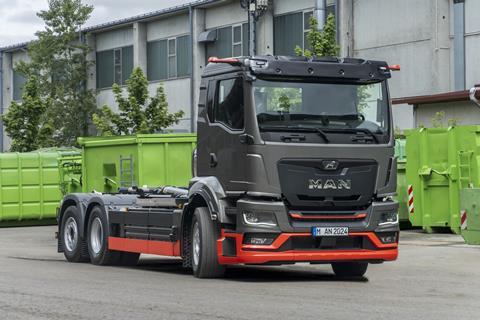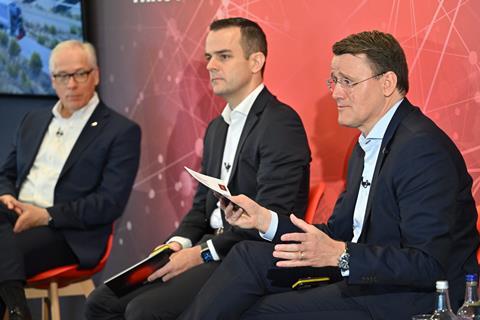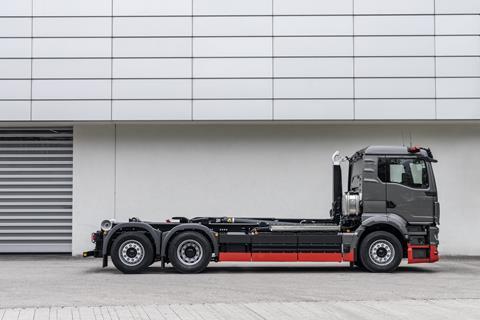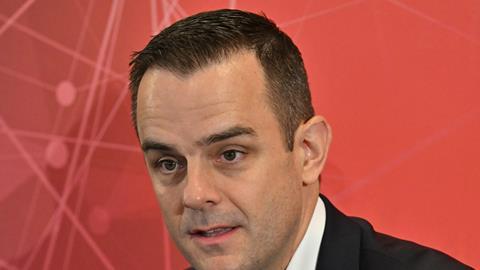MAN Truck & Bus is set to launch its new eTruck in the UK at next month’s Road Transport Expo. UK MD Stefan Thyssen discusses the key questions and concerns operators still have over decarbonising their fleets
For every operator forging ahead with zero emission vehicles there must be twice as many naysayers insisting it just doesn’t work for heavy long-haul trucks. So although he probably wouldn’t admit it, MAN UK MD Stefan Thyssen must be slightly daunted by the level of resistance to battery electric among HGV operators as the company prepares to launch its eTruck into the UK market at Road Transport Expo (RTX).
In fact there’s a bit of a disconnect between the enthusiasm and positivity that pervades MAN’s recent media event at the firm’s Swindon base and the wariness of its prospective new customers. After all, many of these fleet operators are working on wafer-thin margins and facing unprecedented challenges. Yet they’re being expected to invest in expensive new trucks with no sign yet of a reliable charging infrastructure.
As time goes on, that expectation will all too quickly become a pressing demand. The government will phase out the sale of diesel HGVs between 2035 and 2040. But the average price of a 44-tonne tractor unit is £120,000 and an electric replacement is around £360,000. The trucks are also heavier and probably won’t have more than a 400-mile range. Trying to encourage people to buy them when most don’t want them and can’t afford them won’t be easy.
Nevertheless, MAN’s first demo eTrucks will appear on British roads by early next year amid plans for 50% of its vehicles to be zero emission by 2030. The company presented the new all-electric 4x2 and 6x2 chassis range for the first time on 13 May at IFAT 2024 in Munich.

Interestingly, our chat with Thyssen coincides with a meeting in Parliament of a truck infrastructure focus group, hosted by shadow transport minister Bill Esterson MP. A quick glance at his subsequent post on LinkedIn, and the string of comments that follows, puts the two sides of the decarbonisation argument in sharp focus. Esterson is full of positivity, but his critics describe the discussion as “completely ludicrous”: Motorway services won’t cope. It takes too long to charge. Where’s the infrastructure? Why not reduce the cost of electricity first? Or wait for battery technology to evolve to a point where it’s actually possible? The list goes on.
Looking into the details
It’s that word infrastructure that every conversation, every argument, about battery electric trucks always centres on. It’s the main sticking point for many operators and a good excuse to stubbornly (or perhaps wisely?) stick with diesel and ‘see what happens’.
But the great thing about Thyssen is that he’s prepared to dig deeper into the specifics of the issue and reveal operators’ primary concerns; those smaller details that wider discussions over infrastructure often miss.
He’s also happy to answer questions not just about well-documented battery electric success stories like DPD but also the operators running fleets of between 30 and 50 vehicles – typical SMEs. Some are eager to begin their zero-carbon journey, others are far more cautious, and some are simply paying lip service to keep up appearances.
“The feedback we’re getting from operators is all very different,” he tells MT. “There are some saying it’s not for me, even those running 2,000 trucks. They say they’ll wait to see how it goes with the charging infrastructure and price, or that the total cost of ownership isn’t working for them, or that they have too big an operation.
“Then there are other operators saying, ‘this will come, I have a strong business, I have a good foundation, my financial situation is strong. I want to be part of this journey. I want to understand what’s going on.’
“There are also certain companies where the business case absolutely makes sense,” Thyssen insists. “The operator who is using the energy from solar panels, for example, and is running a hefty mileage. It gives it a business case in a few years’ time.”
Ultimately Thyssen’s message to operators is the higher the mileage the better the business case. Those with only a handful of trucks will shy away but those with 30 to 50 are “extremely curious” and have “thousands of questions”.
“There’s a big group in the middle who want to look and see what others are doing and whether it makes sense,” he says. “But the customers we’re talking to are from all kinds of segments, including those with 30-50 trucks. I think we’ll see progress there very soon.”
Convincing the sceptics
But for true progress, those thousands of questions need to be satisfactorily answered. As Thyssen accepts, many operators intend to simply refresh their existing diesel fleets as close as possible to the phase-out date and then run them for at least another 10 years. So what might change their minds? And how easy is it to convince them that MAN, or the government, or their own customers, can help?
“There are many forward-looking operators out there who know what’s coming,” Thyssen says. “If they wait until the last day and then swap hundreds of their vehicles to electric in one go that will be a very bad decision. So they want to know how it works, how they’ll need to structure their operations, their route planning, where they need to have a charging facility in place? Do they need to have contracts with charging suppliers to be able to run up the motorway?
“They also really want to understand how the battery works, they want to understand the different options of having different numbers of battery packs on the vehicle and the best option, how fast you charge, even from what side of the vehicle you charge. We’ve had some really good conversations.”
Thyssen also counters recent claims by Evri head of fleet David Landy and others that operators will be forced into buying trucks they may not want in their next buying round.
“I’m not so sure that works with electric vehicles,” he argues. “You can always push diesel vehicles into customers because you can just swap them out. But if you start to push electric vehicles into customers where there is no infrastructure and it doesn’t make any sense to the operation I’m not sure it works for anyone.”

Infrastructure concerns
Lack of infrastructure remains the biggest concern, he confirms: “Operators doing heavy mileage will not run depot to depot, they’ll be going from Bristol to Glasgow or similar,” he says. “So I think the question I would be asking is, ‘I know when I’m going there so can I block my spot at the charging station at 11.45 because that’s the lunch break for the driver?’ They need those specifics. The slot needs to be available when they show up.”
To Thyssen this is the fundamental change that needs to happen before operators and drivers have total confidence in switching to electric. It’s all very well talking about a dense infrastructure but the ability to prebook slots is what really matters.
“With a diesel truck you just fill up and go,” he says. “And it’s also frustrating when you’re running an electric car, you want to charge it and there’s nothing available. For trucks it’s even more important because they only have 45 minutes and they can’t look for the next charging point, and the next one…”
Help and support
Another key question is how much MAN, or an operator’s customers, can do to support them with the transition? Despite many of these customers trumpeting their eco credentials – in some cases largely for commercial gain – they seem unwilling to help foot the bill for a fleet of electric trucks. That includes some of the big players who could arguably afford to contribute more.
So who’s going to pay if the operator can’t?
“We’re talking to the customers and having individual total cost of ownership discussions,” Thyssen responds. “And we’re talking to the customers about the different parameters, like how much do you pay for electricity, what’s the upfront cost of the vehicle, and what is the residual value, if there is one? The feedback in some cases is that it doesn’t make any sense. You see this with both HVO and electric.
“The customers of operators are pushing for it but there’s a reluctance to pay for it,” he says. “In some cases the end customer is really pushing hard for it but in other cases they demand it and they tell operators to find a business case to make it work.”
So with battery electric the focus of MAN’s latest launch, where does HVO and hydrogen fit into its plans? The company will deliver around 200 hydrogen-powered heavy trucks to customers as early as 2025 for use in areas without adequate charging infrastructure or for markets where sufficient hydrogen is already available. However, MAN insists that its primary focus remains on the development of battery electric trucks.
“The cost aspect is the main issue for HVO,” Thysssen adds. “It’s more expensive but if the government wanted everyone to use it they could. It’s not a long-term solution but it’s a really good intermediate step.”
For the moment, like many, he agrees that the government isn’t doing enough to solve the challenges. Last year former roads minister Richard Holden MP reminded operators that the 2040 phase-out deadline for heavy trucks is still a long way off and that the cost for an electric version would come down in the same way as it has for buses. He also insisted the government should not be expected to fund the transition on its own and that success would rest with commercial partnerships.
“No, from a government point of view, we need more support and clearer targets for infrastructure,” Thyssen says. “That’s by far the most crucial topic for us. The second topic is the implications for weight and dimensions, which is a big one – I’m talking here about 4x2s, axle loads etc, and the third one is making battery electric vehicles a really attractive proposition for the operator.”
That all sounds great in principle, but how do you go about it?
“You can do this in two ways,” he explains. “You could make the battery part more attractive by using subsidies or similar programmes. Or you could make the diesel less attractive and therefore make electric more attractive.”
Growing momentum
Thyssen is a keen supporter of the government’s £200m Zero Emission HGV and Infrastructure Demonstrator (ZEHID) scheme, which he predicts will probably bring an extra 350 battery electric vehicles on the road. “It’s a massive start but it’s not enough,” he reiterates. “So we’re having good discussions with customers and government to push for support. There are a few consortiums in there buying vehicles and it’s not just about vehicles but infrastructure. That will give it some momentum.”
Thyssen agrees that the transition needs to be a joint effort, rather than calling for government incentives. “The government shouldn’t be expected to do everything,” he says. “We are doing a lot of stuff to get our products and workshops ready to support our customers on the transition but all parties have to work together.”
The eTruck launch also comes at a time when MAN is looking to grow its market share in the UK. In 2023 this was 8.5%, this year it stands at 10.5%. “We don’t have the market share we want and we’re working hard to become bigger,” Thyssen says.
Understandably, he won’t be drawn on which of his competitors are following the best decarbonisation strategy, pointing instead to how other sectors are tackling the challenge. “There’s a start-up in Scotland running inter-city operations purely on electric coaches, which is brilliant,” he says. “But I’m interested in any company with a story to tell and it doesn’t matter if its MAN, Volvo, Scania or DAF.”
“It will be really cool to see the feedback from RTX,” Thyssen concludes. “We have so many people there to explain everything. We’re very excited to get the truck into the UK market, that’s what I’m waiting for the most.”















